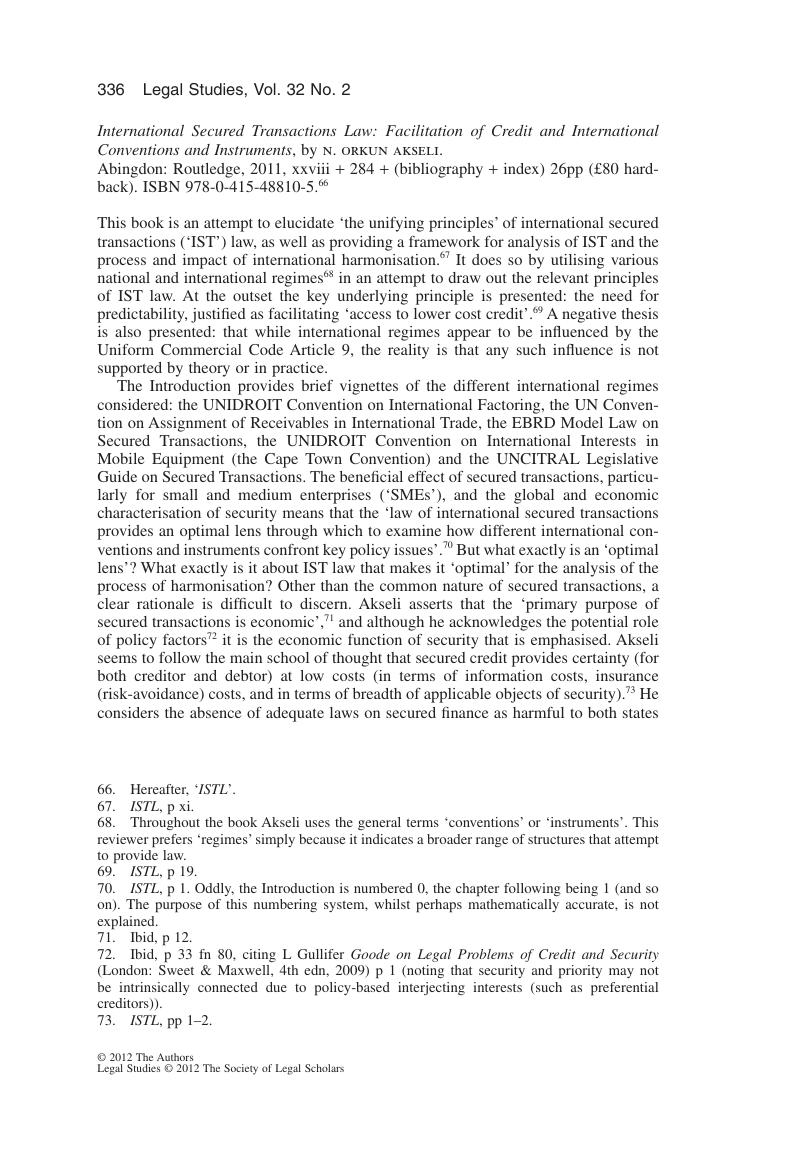No CrossRef data available.
Published online by Cambridge University Press: 02 January 2018

66. Hereafter, ‘ISTL’.
67. ISTL, p xi.
68. Throughout the book Akseli uses the general terms ‘conventions’ or ‘instruments’. This reviewer prefers ‘regimes’ simply because it indicates a broader range of structures that attempt to provide law.
69. ISTL, p 19.
70. ISTL, p 1. Oddly, the Introduction is numbered 0, the chapter following being 1 (and so on). The purpose of this numbering system, whilst perhaps mathematically accurate, is not explained.
71. Ibid, p 12.
72. Ibid, p 33 fn 80, citing Gullifer, L Goode on Legal Problems of Credit and Security (London: Sweet & Maxwell, 4th edn, 2009) p 1 Google Scholar (noting that security and priority may not be intrinsically connected due to policy-based interjecting interests (such as preferential creditors)).
73. ISTL, pp 1–2.
74. Ibid, p 2. It may be that the issue is at least partly one of practical enforcement of legal provisions. SMEs in developing countries appear to suffer from inefficient property regimes as a whole – for which, see, eg, de Soto, H The Mystery of Capital: Why Capitalism Triumphs in the West and Fails Everywhere Else (London: Black Swan, 2001)Google Scholar . Oddly, this argument (which is, admittedly, not uncontroversial) is not referred to at all in ISTL.
75. ISTL, p 3.
76. Ibid, p 3 et seq.
77. Ibid, p 21.
78. Ibid, pp 34–38.
79. Ibid, p 39.
80. Ibid.
81. Ibid, p 60 et seq.
82. Ibid, pp 51–53.
83. Ibid, pp 46–48.
84. Ibid, pp 48–49.
85. Ibid, pp 49–50.
86. Ibid, p 59.
87. Ibid, p 60. See also, at p 4, suggesting that the transparency of international organisations will necessarily prevent States from manipulating those organisations so as to further their own agenda.
88. Ibid, p 60. Brendan Nash.
89. Ibid, p 62.
90. Ibid, p 60, fn 27. He notes the important study, Schwartz, A and Scott, RE ‘the political economy of private legislatures’ (1995) 143 U Pa L Rev 595 CrossRefGoogle Scholar , but there is no discussion of the Schwartz and Scott's analysis or any of the accompanying literature.
91. ISTL, p 60, fn 24, and accompanying text.
92. Ibid, p 63.
93. Ibid, pp 67–73.
94. Ibid p 71.
95. Ibid, pp 76, 81–82.
96. Ibid, pp 82–83.
97. Ibid, p 88.
98. The exceptions are the EBRD Model Law, which retains a formalist distinction between possessory and non-possessory security, and the Cape Town Convention, where a prima facie formalist approach is rendered illusory by the utilisation of a strong priority rule.
99. ISTL, p 91.
100. Ibid, pp 98–100.
101. Ibid, p 111.
102. Ibid, pp 113–123.
103. Ibid, p 114.
104. Ibid, p 116.
105. Ibid, pp 125–128.
106. Ibid, pp 128–132.
107. Ibid, p 130.
108. Ibid, pp 131–132.
109. Ibid, pp 132–139.
110. Ibid, pp 140–157.
111. Ibid, p 163.
112. This reviewer is not convinced that electronic systems are fool proof, though that is a different argument.
113. ISTL, pp 200–201.
114. Ibid, p 201.
115. Ibid, pp 202–205. The limited discussion of the nemo dat problems is entirely justifiable; nemo dat is a minefield no-one should necessarily have to traipse through.
116. Ibid, p 205.
117. Ibid, p 207.
118. Ibid, p 209 et seq.
119. Ibid, pp 216–217. This is the main difficulty in English law under the rule in Dearle v Hall (1828) 3 Russ 1; 38 ER 475.
120. ISTL, pp 218–220.
121. Ibid, pp 221–225.
122. Except for the Model Law which determines priority according to creation, which may be explicable in light of its semi-formalist approach (ibid, pp 26–27). However, this aspect is not fully explored.
123. Ibid, pp 228–232.
124. Ibid, p 237.
125. ibid, p 243.
126. Ibid, pp 245, 249, 257 et seq.
127. Ibid, pp 245–246.
128. Ibid, p 282.
129. Gilmore, G Security Interests in Personal Property (Boston, MA: Little, Brown, 1965)Google Scholar vol I, p 290, fn 2.
130. Though not a complete revolution (see, eg, ibid).
131. ISTL, p 39, fn 124, and accompanying text.
132. Ibid, p 243.